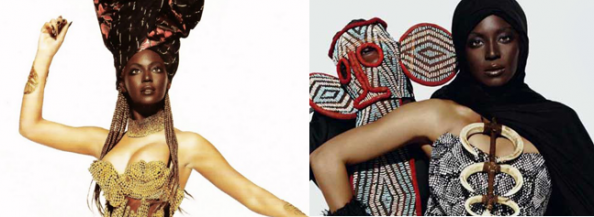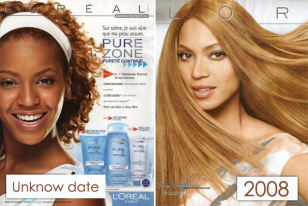
In its latest issue, the French magazine Officiel Paris, displays few pictures of Beyoncé, painted black, supposedly to make her look African. (See all the pictures from the March issue of Officiel Paris here.)
Ironic because in 2008, l’Oreal was accused of digitally bleaching the same Beyonce to make her look white.

It has emerged that Beyoncé was delighted to have her skin darkened for the 90th anniversary of Officiel Paris but also to pay a tribute to one of her biggest inspirations, Fela Kuti, a Nigerian musician and activist.
On French and U.S. blogs, readers have left nasty comments toward the mixed-race singer. People feel that she lightens her skin to look white and now she acts like she is too pale to look African.
Beyoncé: African or European?
I’m not sure if I should feel outraged about these photos but by painting her face jet black, she just perpetrated the stereotype that the typical African women has to be dark-skinned.
The particularity with Blacks is precisely the fact that they come in all sorts of colors. Thus, by darkening only her face to offer a contrast with her pale body, Beyoncé hasn’t gained much credibility. The message I’m getting from her pictures is, « I don’t look African, but I’m nice enough to mimic them ».
Far from trying to make a cultural statement, I suspect Beyoncé of darkening her skin to keep tongues wagging about her alleged skin bleaching to pass for white.
I don’t know if she bleaches her skin but I don’t believe she is trying to pass for white judging by the way she shakes her booty and hips on TV.
Darkening is as bad as bleaching
I was once told that when in Destiny’s Child, Beyoncé was told to keep her hair braided and her skin always tanned in order to look Black. Yet another stereotype! When it comes to cultural identity, culture and education can play a bigger impact than race or skin color…
I’m african and have never worn any ethnic clothing so I don’t know what the Officiel Paris magazine was trying to sell but I’m not buying it.
I guess people like me pose a real problem to advertizers. Since my personal culture emcompasses pretty much everything, there is nothing concrete to describe my personality and I struggle to relate to most ads (whether African, European or North American).

